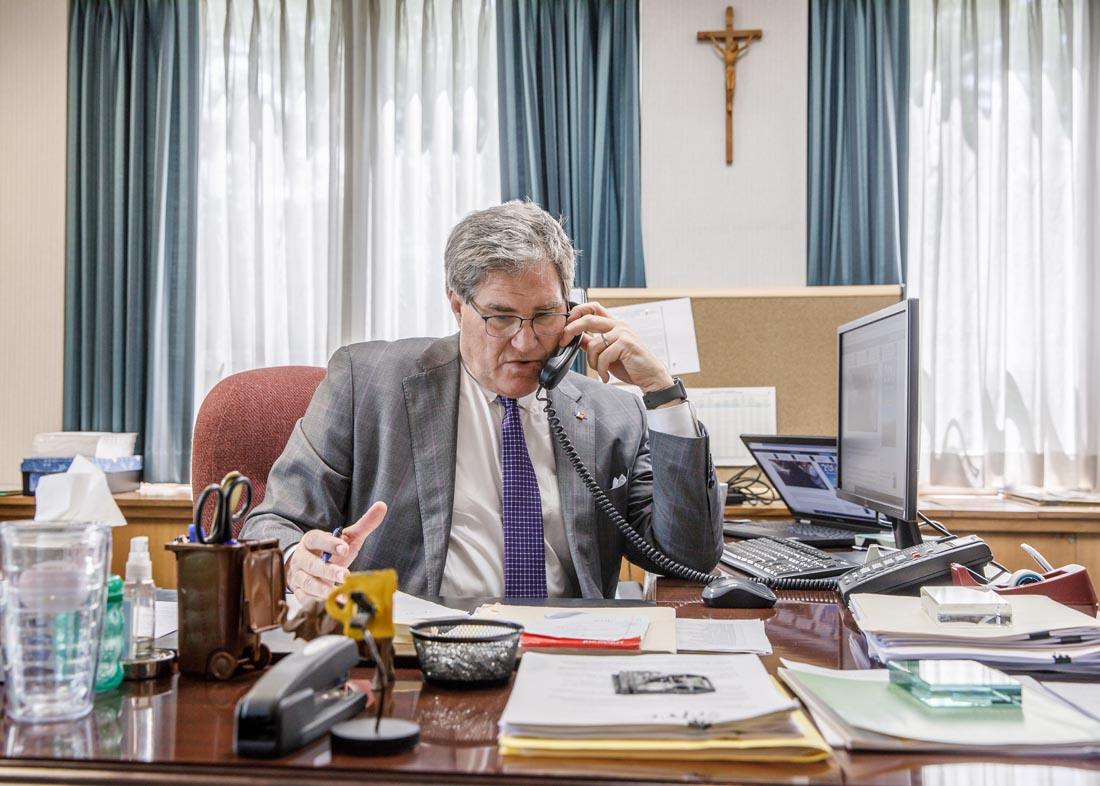
PHOTO BY AARON JOSEPH
Connecticut Catholic Conference Executive Director Chris Healy, second from left, and Deacon David Reynolds, associate director for the Conference, far right, discuss bills in the Legislative Office Building in Hartford last year, with Rep. Cara Pavlock, R-Bristol, and Rep. Mark Anderson, R-Granby. Healy says the Conference with the assistance of others will battle against any bills proposing assisted suicide in this legislative session, which begins today, Feb. 7.
Story by Karen A. Avitabile
The Connecticut Legislature begins its session today, Feb. 7, in Hartford. And for the 12th year in a row, state lawmakers are expected to take up a bill that would allow people to choose to end their lives through prescribed medication.
Last year, the proposed legislation – Senate Bill 1076 – was raised by the Connecticut General Assembly’s Public Health Committee. Its premise was to allow patients to pursue life-ending drugs when faced with a terminal illness. Although the bill made it out of the PHC, it was stalled in the Judiciary Committee and was not taken up for further review.
If any physician-assisted suicide bill is raised by the lawmakers during the current session, the Connecticut Catholic Conference again will be at the forefront to oppose it.
“God gives us this one life,” says Chris Healy, executive director of the Connecticut Catholic Conference, the state’s public policy and advocacy arm of the Catholic Church. “We are morally called by God to support life and help people through great crises.”
Last year, the Conference went to work with a large coalition of opponents from the disability community, progressive groups, religious groups, the Knights of Columbus, hospice and palliative care advocates, and others to oppose Senate Bill 1076.
Currently, 10 states and the District of Columbia have passed aid-in-dying laws. In past years, Connecticut’s version of this bill was similar to Oregon’s law that allows 21-year-olds and older with a terminal illness and six months or less to live to take prescribed medication to end their life.
According to Healy, those states and Canada, where this system has been adopted, show that safeguards to avoid abuse of physician-assisted suicide are often ignored and the number of people partaking is expanding. He goes on to say that legalizing physician-assisted suicide opens a pandora’s box of potential abuses that are difficult to track.
The drugs being used for physician-assisted suicides are not approved by the U.S. Food and Drug Administration, Healy adds, and there has been no supervision for their implementation.
Advocates of physician-assisted suicide said the bill proposed last year in Connecticut provided stringent safeguards against abuse and outlined rules that must be followed by physicians. But Healy disagrees, saying that suicide overall is an epidemic in the United States, and the adoption of aid-in-dying laws would put the most vulnerable at risk, including individuals who are disabled.
“This is all a way for health insurance companies to ration care and increase a scenario where a patient is vulnerable to take assisted suicide suggestions so they are not a burden to their families,” Healy says.
As an option to physician-assisted suicide, Healy steers people toward the expansion of hospice and palliative care for the terminally ill and mental health services provided in the state.
The Connecticut Catholic Conference has established a website, ctcatholicpac.org, for updates and more information about the status of physician-assisted suicide proposals in Connecticut. Healy urges people to get involved with their local elected state legislators to oppose any proposals that come before the Legislature that threaten the sanctity of life.
“Only God can be God,” he adds. “The state cannot play God.”

PHOTO BY AARON JOSEPH
Chris Healy is the executive director of the Connecticut Catholic Conference, the public policy and advocacy arm of the Catholic Church in Connecticut.
